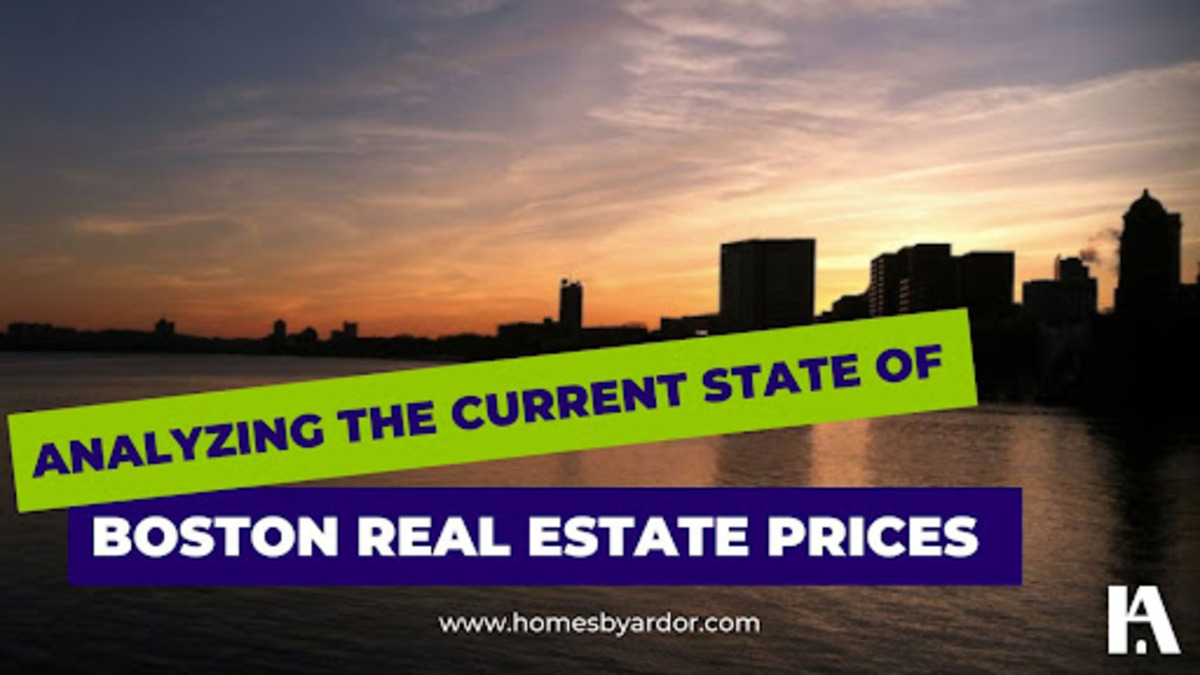
Today, the real estate market in Boston remains a hot topic of interest to investors and homeowners alike. With the economy and market conditions constantly changing, many wonder about the current direction of home prices.
And that’s tough to say, as Boston remains one of the most volatile real estate markets. You only need to look at the median home prices to see how topsy-turvy the prices can get.
It’s no wonder real brokers in MA and trend watchers are predicting that the market prices are downturned. Is that the case, though? In this piece, we’ll show you what’s behind all those numbers and projections in the Boston real estate clime.
Looking to the Experts
To understand the current state of Boston real estate prices, we must begin with the real estate professionals and their submissions. Regarding real estate in Boston, several broker services are well-known and respected.
Dan Wu broker services, United Brokers, and Charlesgate Realty Group are all making a name for themselves by providing excellent service to clients and staying on top of market trends. One can imagine that they bring their wealth of experience and expertise. Their insights can prove invaluable when it comes to understanding the current state of the market.
Other prominent players alongside United brokers in the Boston real estate scene include Insight realty group, Class Realty in Boston, and Vogt Realty Group. Vogt, in particular, has been in business since 2009 and has built a reputation for providing quality service and a personalized approach to each client’s needs.
What are these guys saying about the current price direction? They all agree that market activities have steadily declined since January this year. Sales are happening less month-on-month and year-on-year, with single-home properties and condominium sales being the worst hit.
Reports from the Greater Boston Association of Realtors say the major cause is the reinvigorated buyers’ activity targeting the spring market. Incidentally, mortgage rates have declined slightly since last fall, and both events can stall sales, as they seem to have done.
Market Events to Note
Beyond the expert analysis, you should know how the changing prices manifest in the property market. Below are some of the notable market events that might interest you:
Median Prices Below Record Highs
The median prices in the Boston real estate market have been paradoxical so far. While they’re generally on the up, these median prices keep dropping compared to the nation’s record highs, which has been so for the past six months into 2023.
Even more puzzling is that the median prices for condominiums are increasing while single-family homes aren’t. The rising mortgage prices seem to favor the former.
From the outset, it’s easy for potential homebuyers to feel that a house in Boston price is dropping due to the wavering median prices. However, the opposite might be the case: the median prices for Boston homes might look like they’re declining, but technically aren’t.
The record median prices elsewhere are rising sharply thanks to the new mortgage rate. When the rates come down, the prices follow suit, only to find Boston homes at the new record high. That probably explains why buyers and sellers are holding out on new deals.

Properties Going for Less Than the Asking Price
Another trend to note is that more properties are closing for much less than their asking prices. Again, it’s the single-family apartments and condominiums that are worst hit. It’s not uncommon to see single-family properties and condos go for only about 96% and 97% of their asking prices, respectively.
Why is that so? Well, buyers aren’t as financially capable to negotiating further into the purchase process, no thanks to the mortgage rates hike. Sellers are also likely to budge since there aren’t many buyers considering a full property purchase.
It’s worth mentioning, however, that what we see here is only an illusion of a price drop on Boston properties. Sellers will only endure offers less than their asking price as long as the higher mortgage rates keep buyers away. When the rates come down – and, by the going indications, they soon will – you can expect the prices on MLS listings in Boston to ramp back up.
A Gradual Shift to a Buyer’s Market
Real estate in Boston, Massachusetts, is shifting to a buyer’s market scenario, but that’s hardly the first time. Generally, a buyer’s market works through an oversupply of single-family and estate homes for sale and a lack of buyer demand. That means sellers may need to lower their asking prices or offer other incentives, such as closing cost credits or repairs, to get buyers to close a deal.
A buyers’ market scenario in the Boston real estate market could result in a slowdown in price appreciation or even a decline in prices if there is a significant oversupply of homes on the market.
Notice how we included the phrase “slowdown in price appreciation”? That’s because a buyers’ market shift doesn’t mean an automatic drop in home prices, and real estate prices are likely to rally about a certain point rather than a significant drop.
Nevertheless, sellers have no other option but to compete with each other to attract a limited pool of buyers, and may need to lower their prices in order to make their homes more attractive.
It bears reiteration that a shift in the local market conditions to a buyer’s market happens from time to time. For example, in the wake of the COVID-19 pandemic, the Boston real estate market experienced a shift toward a buyer’s market.
This was due in part to a slowdown in demand from buyers as a result of economic uncertainty and job losses, as well as an increase in the number of houses for sale in Massachusetts Boston.
The Buyer/Seller Stalemate
Ordinarily, the Boston real estate market is highly competitive and has historically been characterized by limited supply and high demand. That means that even when we have a buyer’s market on our hands, prices may not necessarily decline significantly.
In fact, in some cases, sellers prefer to hold on, and not put out new Boston MLS listings rather than sell at a lower price, which will immediately limit the supply of homes on the market and rally the prices. However, in the current market scenario, interest rates – rather than the sellers – are playing a significant role in price control.
Typically, when interest rates are low, buyers may be able to afford higher-priced homes, which can drive up prices. Conversely, when interest rates are high – as is the case here – buyers may have less purchasing power, which can push down on prices.
You then get a buyer/seller stalemate. Sellers not willing to sell at lower prices, and buyers aren’t interested in paying a higher rate.

Are Boston Real Estate Prices Really Dropping?
With all these market pointers, we can circle back to the real question here: Are Boston Real Estate prices dropping?
The short answer is no, but we’d be oversimplifying it if we didn’t explain why that is so. You see, there are in fact, some price changes happening in the market over the last few months. Property prices aren’t hitting the record highs they previously did, and sellers and buyers are wary as ever about the pendulous mortgage rates.
However, that has only caused a property price stagnation at best and a temporary price drop at worst. Boston real estate prices are firmly hinged on the current interest rates that recently got increased. With enough time, the rates are expected to drop, tipping the prices back up again. It’s a waiting game for many buyers and sellers, and it might not be long for the deadlock to get broken.
The Future of Boston Real Estate Market: What to Expect
While it is true that the current Boston house prices will likely ramp back up again, it’s not all bad news for the market. Here’s what to expect in the coming months with the real estate market:
Influx of Millennials
Going forward, real estate expert expect more millennials to seek property in the Boston real estate market. Interestingly, the influx is set to happen despite the high median home price of $740,000.
Why millennials, though? For one thing, Millennials are likely to get drawn to Boston’s robust job market, which offers many opportunities for young professionals. Boston’s got a strong economy and is home to numerous industries, including technology, healthcare, and education. With so many job opportunities available, it’s expected to see Millennials willing to pay a premium to live in Boston.
Another draw for Millennials is Boston’s thriving academic community. Think Harvard and MIT. These institutions readily attract many students and young academics to the area. Gradually, a significant demand for rental properties grows, driving up property values as a result.
Boston also has an extensive public transportation system, making it easy for Millennials to get around the city without a car. That’s such a significant cost savings for young people who may not be able to afford the expense of owning a vehicle.
Despite the high median home price, many Millennials are willing to pay a premium to live in Boston because of the city’s many amenities and opportunities. What’s more, some Millennials may choose to purchase smaller or more affordable properties, such as condos or townhouses, in order to get a foothold in the market and take advantage of the city’s long-term growth potential.
Significant Real Estate Investment Opportunity
When it comes to real estate brokerage and investment, it’s general knowledge that cash flow is the ultimate prize. And in Boston, you get to strike gold. With its top-notch reputation for safe and high-yield investments, Boston’s housing market is a haven for savvy investors.
For one thing, a limited inventory and a dense market means that Boston’s real estate market will offer a stronger potential for property appreciation, with prices projected to increase by up to 6-8%.
But there’s precedence for that: despite the steady property increases since the 2008 financial crash, land prices remain high, and building height restrictions make it challenging for developers to gain approval for new construction.
Consequently, demand for new properties continues to outstrip supply, pressuring homebuyers while presenting a unique opportunity for cash investors. The result? Home builders are currently cutting property prices by up to 6%, presenting a prime opportunity for new investors and anyone looking to make serious profits from real estate brokerage.
Safer Clime for Buyers
Thanks to steady population growth and limited supply, Boston’s real estate market offers a promising future for any property purchase. And with building height restrictions, Boston can’t go vertical, making the market even more attractive to those who want to reap the rewards of a limited supply and high demand.
For instance, if you’re looking to buy into the Boston real estate market, Allston is an excellent neighborhood to consider. With median property prices well below the city average, Allston offers homebuyers an opportunity to get in on the ground-floor and maximize their returns.
Overall, Boston’s real estate market has consistently outperformed other major cities, making it an attractive option for investors who want guaranteed appreciation and steady cash flow. And with so much potential in the market, Boston’s booming real estate scene is about to get even better for buyers.
Bottom Line
While the Boston East West real estate market may experience seeming price drops, it remains one of the country’s strongest and most promising markets. The median home price has ebbed a bit, but that might change in the coming months. Moreover, the potential for appreciation and cash flow still makes Boston MA real estate a worthwhile investment.
On the whole, it’s important to keep in mind that real estate markets are always in flux, so it’s fine if it seems that the real estate prices are dropping, and they aren’t – at least, not for long.
FAQs
Is Boston Real Estate Overpriced?
No. Boston is only high-priced and not overly so. The city has one of the highest median home prices in the United States, with a median home value of about $740,000. While that may seem astronomical, factors such as limited supply, high demand, and steady population growth come into play.
When Is the Best Time to Buy a House in Boston?
June and December. That’s when housing inventories peak and 30-year mortgage rates drop, respectively. Also, look for February, as buyers tend to save up to 16 days when closing a purchase by then.
Why Is Rent in Boston So High?
It’s the limited housing supply and high demand. There’s barely any new construction, and many of the existing properties in Boston are historic or protected by zoning laws, limiting the number of available units.
If you’re looking for a home on sale in the Boston area, Ardor Homes Massachusetts is on hand to help. With our expertise in the local real estate market, we can help you find the perfect home that fits your needs and budget. Contact Ardor Homes Massachusetts today and let us help you realize your homeownership dreams.

In her 25-year career, Steph Wilkinson has been involved in the acquisition, marketing and sales of over $3 Billion dollars of residential real estate. A number of years ago, Steph transitioned into Brokerage Leadership for National real estate brands and tech start-ups. She has served as a Business Strategist for real estate agents and brokerages alike and is also a real estate coach and trainer. In her new role with the Iconic Team, Steph will be responsible for the growth of the team and will be working with all of our agents to increase their productivity and bottom line.




